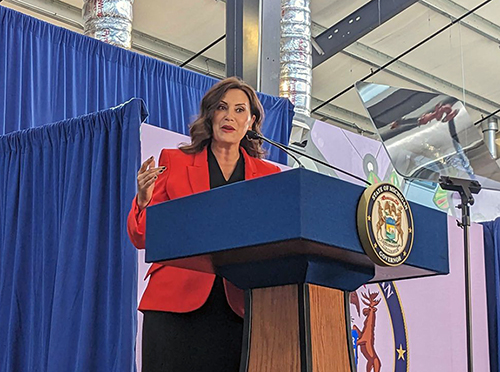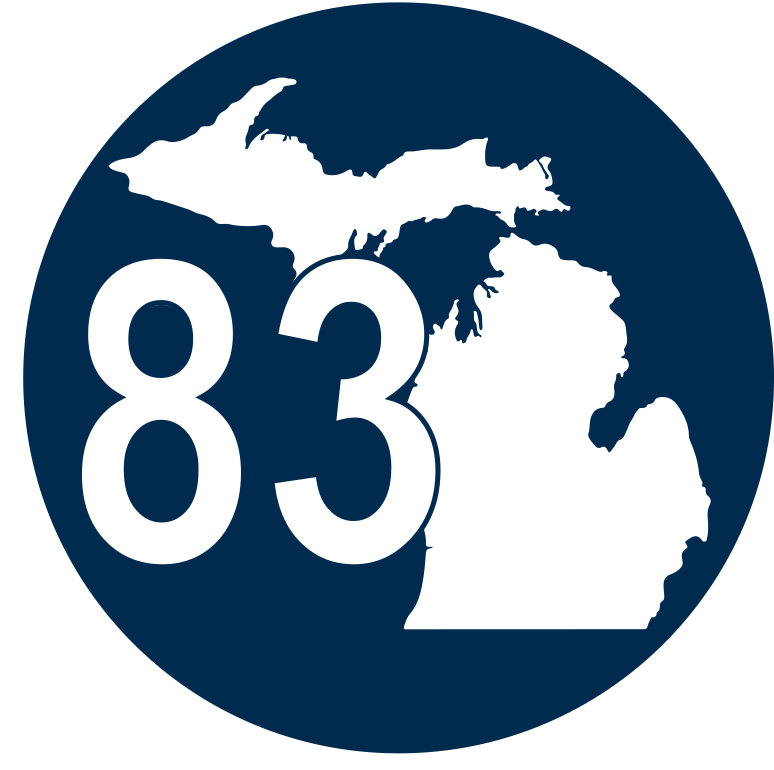Governor’s speech carries concerns for county governments

Gov. Gretchen Whitmer spoke in Lansing on Aug. 30, 2023, about her legislative priorities for the fall. (Photo: Bridge Magazine)
Gov. Gretchen Whitmer announced her fall legislative priorities that included a push for clean energy, streamlined permitting and increased election security in a speech on Wednesday. While the governor traditionally delivers a State of the State Address annually in January, her presentation this week felt very much like a second act to her 2023 address.
As MAC reported last week, in a bid to enact a 100 percent clean energy standard, the governor plans to empower the Michigan Public Service Commission (MPSC) to regulate solar and wind projects and pre-empt local control. As the industry begins to transition away from traditional carbon energy and toward renewable energy, it is vital that local governments play a central role in the planning process and buildout of infrastructure. MAC is opposed to statewide siting of wind and solar projects and will work with the legislature to ensure local voices are not lost in this process. (See the item below on how you can speak out against the governor’s plans against local control.)
While discussing election security, the governor advocated for improved safety measures for voters and poll workers. Without identifying specific legislation or next steps, she highlighted the expansion of voting rights as a top priority.
MAC is seeking clarity from the governor’s team on other items that could potentially impact counties:
She addressed paid family leave as something she hopes to expand for small businesses, and it remains unclear whether local units of government will be included in this proposal.
Additionally, she acknowledged weaknesses in our permitting processes and advocated for a more streamlined approach. MAC understands this to mean permitting at the state level, which would have little to no impact on locals.
MAC will watch these proposals closely to ensure counties are not impeded in anyway.
For more information on MAC’s advocacy work, contact Deena Bosworth at bosworth@micounties.org.
Learn all you ever wanted to know about road funding at conference
 As the summer driving season winds down, no Michigan resident, or public leader, needs to be reminded of the state’s ongoing infrastructure challenges.
As the summer driving season winds down, no Michigan resident, or public leader, needs to be reminded of the state’s ongoing infrastructure challenges.
The 2023 Annual Conference will feature a special two-part, two-day workshop focused on the central state law governing Michigan roads: Public Act 51.
On Oct. 1, Ed Noyola of the County Road Association of Michigan, a MAC affiliate, will review how the Michigan Transportation Fund (MTF) serves as the distribution model for road funding in Michigan. Through an intricate formula crafted over many years, the MTF allocates funds to state, county, and municipal road agencies to maintain, repair and improve our roadways.
On Oct. 2, Noyola will continue his review by taking a closer look at the county’s expenditures of the Michigan Transportation Fund, touching on such topics as operations, contracting and adhering to federal and state standards. The Monday session will provide a more technical, hands-on perspective for managers and county commissioners to understand their role in Michigan’s local transportation network.
This is a “must” session for any county leader who wants to understand how Michigan funds and fixes its road network.
For times of these sessions, and more details, check out the conference agenda.
Registration continues for the 2023 Michigan Counties Annual Conference to celebrate MAC’s 125th Anniversary.
Remember, special early-bird pricing for this event expires on Sept. 8, so register now!
For questions about MAC events, contact Tammi Connell at connell@micounties.org.
County leaders urged to speak against attack on local control
![]() A clean energy plan being promoted by Gov. Gretchen Whitmer could take local control over renewable energy buildout out of the hands of local governments. As part of her top legislative priorities for the fall, Whitmer plans to grant all siting authority for solar and wind developments to the state, stripping local control over such projects.
A clean energy plan being promoted by Gov. Gretchen Whitmer could take local control over renewable energy buildout out of the hands of local governments. As part of her top legislative priorities for the fall, Whitmer plans to grant all siting authority for solar and wind developments to the state, stripping local control over such projects.
The plan would allow the Michigan Public Service Commission to work directly with electric utilities and independent developers to determine the location and size of solar and wind farms. It mirrors previous attempts by the Legislature to preempt local control over aggregate mining operations.
MAC opposes any plan that preempts local governments from having a say in local development projects. As industry leaders, federal entities, and state officials have vowed to transition away from traditional carbon energy and toward renewable energy, it is vital that local governments play a central role in the planning process and buildout of infrastructure.
Elected county leaders are urged to use the link below to send your own email of opposition to your legislators today!
Click here to send your email statement in support of local control.
ICYMI: Check out all of Podcast 83’s special summer episodes on key issues
 With the Legislature generally out of Lansing since May, MAC’s Podcast 83 team used the summer to present a variety of special episodes on key topics before county government.
With the Legislature generally out of Lansing since May, MAC’s Podcast 83 team used the summer to present a variety of special episodes on key topics before county government.
If you missed them when first released, fear not, you can view them 24/7 at MAC’s YouTube channel:
- Septic Code legislation with guest Rep. Phil Skaggs (D-Kent County)
- Materials management changes
- Revenue Sharing Trust Fund efforts
- Needed changes in Chapter 22 of the state’s Drain Code
- Juvenile justice reform work
Expect to see regular Podcast 83 episodes resume in mid-September as the Legislature returns to Lansing for its fall meeting days.
And if you have a suggestion for a future episode topic or guest, let us know via email to melot@micounties.org.
Transportation asset conference set for Sept. 26
 Registration is now open for the 2023 TAMC Asset Management Conference, to be held Sept. 26, 2023, in Grand Rapids.
Registration is now open for the 2023 TAMC Asset Management Conference, to be held Sept. 26, 2023, in Grand Rapids.
The conference is sponsored by the state’s Transportation Asset Management Council. Kelly Jones of Ingham County is the MAC representative on that panel, which reports to the Michigan Infrastructure Council and the State Transportation Commission.
Among topics to be discussed at the conference are:
- Tips & Recommendations on How to Build a Quality Chip Seal
- Michigan Infrastructure Council Update
- National State of Practice on Local Asset Management
- 2022 PASER Data Analysis and Update
Check out the full agenda. Note: The room block of $85 per night at the DoubleTree hotel expires on Sept. 5. You can book your room(s) online or by calling 616-957-0100; mention that you are booking your room as part of the Asset Management Conference (group code: XMG).
Registration fee is $65 per person and all sessions are in-person only. Deadline to register is Sept. 17.
MAC offices closed for Labor Day

Murray Local No. 2 float in Labor Day parade in Detroit in 1942. (Photo: Library of Congress)
MAC’s Lansing offices will be closed on Monday, Sept. 4 to observe the federal holiday on Labor Day.
Normal office hours will resume on Tuesday, Sept. 5 at 8 a.m.
“In 1894 President Grover Cleveland created Labor Day by signing federal legislation declaring the first Monday in September a national holiday,” notes the Walther Reuther Library in Detroit. “Yet the origins of Labor Day predate his action by many years. As the number of trade unions grew in America during the mid- to late-19th century, their members began to hold periodic parades, rallies, picnics and other events to demonstrate the talents and accomplishments of American workers.
“For more than 100 years, Michiganians have participated in Labor Day parades and other celebrations. One of the first Michigan labor parades took place on July 4, 1865, when more than 4,000 union members — on their way to a picnic —marched down Detroit’s Woodward Avenue, carrying banners, tools and other symbols of their trades. By the turn of the 20th century, similar demonstrations were held in urban centers across the state.”
Staff picks
- Are claims that social media polarize us overblown? (Niskanen Center)
- Areas represented by Democrats received 90% of pork projects in Michigan’s budget (MLive)
- ‘Juvenile Expungements’ focus of SADO webinar Sept. 21 (Detroit Legal News)
- States at the forefront of fights over wetlands protections after justices slash federal rules (Associated Press)
